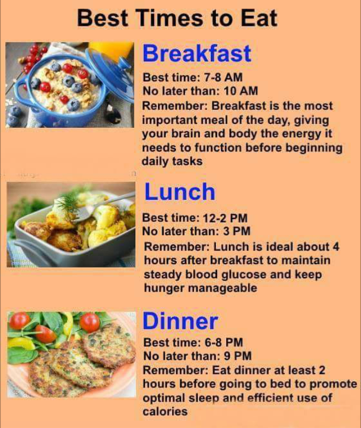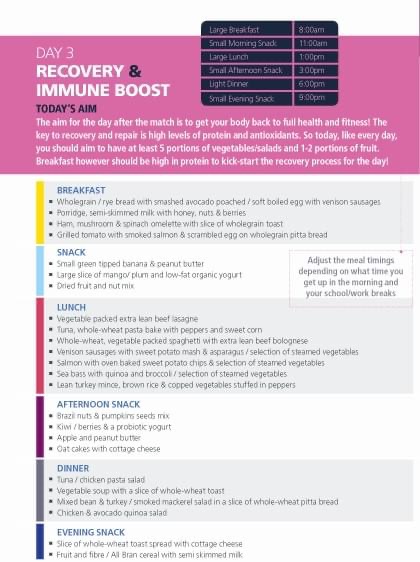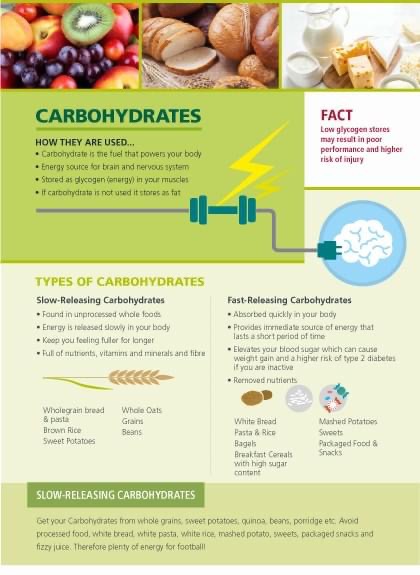
What to Eat and When!
How you play on game day depends on what you eat and drink for a few DAYS before, not what you eat a few HOURS before.
If in a tournament, meals in-between games will replace some of the energy you've used up, but most of the energy you'll use in a game comes from what you eat the day before a game, not what you eat the day of the game.
For evening games, eat a good breakfast, fill up at lunch time with a big meal like whole grain pasta/rice, salad and chicken/fish, and then have a light "lunch" late in the afternoon.
For tournaments, where you usually have a morning game, you have to eat a good dinner and a bedtime snack the night before.
Have breakfast at least two hours before the game or just snack if you slept in. Lunch between games should be light, and something that will get digested before the next game.
In between games, stay away from fried food and foods that are high fat.
Please be aware: Everyone is an individual and what works for one person, may not work for another.
It is Important that YOU experiment with pre-game meals and routines that work best for your body and mind.
What are Carbohydrates?
Function of Carbohydrates: Carbohydrates provide fuel for the central nervous system and energy for working muscles.
Simple vs. complex carbohydrates
Carbohydrates are classified as simple or complex. The difference between the two forms is the chemical structure and how quickly the sugar is absorbed and digested.
Complex carbohydrates include legumes, grains and starchy vegetables, such as potatoes, peas and corn.
Simple carbohydrates are found mainly in fruits and milk, as well as in foods made with sugar, such as candy and other sweets.
The Science behind carbs: During digestion, your body breaks down carbohydrates into sugar. The sugar enters your bloodstream, where it's then transferred to individual cells to provide energy. Sugar is stored in your liver and muscles as glycogen.
Good Carbs vs. Bad Carbs
Carbohydrates commonly considered bad are usually simple carbs such as pastries, sodas, highly processed foods, white rice, white bread and other white flour foods. Bad carbs rarely have any nutritional value.
Carbohydrates usually considered good are usually complex carbs, such as whole grains, fruits, vegetable, beans and legumes. These are not only processed more slowly, but they also contain a bounty of other nutrients.

What You Eat and When You Eat It!
2/3 days before the game: Carbo-loading should begin 2 days before a game, where a higher amount of calories are consumed.
2/1 days before the game: Second day of carbo-loading continues. Carbo-loading can begin today if preparing only for a single match the next day.
If the game is in the afternoon: Breakfast should be large, lunch should be medium to light depending on time of game.
Breakfast:
Granola bars
Juice – Low in Sugar
Banana-Peanut butter toast
Bagel or toast (Whole Wheat)
Yogurt – Low Fat, Greek yogurt
Eggs – Hard/soft boiled, scrambled, omelet
Smoothie – Add low fat milk, Greek yogurt, coconut milk, nuts, seeds, fruit fresh/frozen, vegetables, tofu.
Whole grain cereal / Oatmeal – Add fruit and honey/jam to your oatmeal to help keep you satisfied
Unsalted nuts – cashews, almonds, walnuts, chestnuts, Hazelnuts, coconut, pine nuts, Brazil nuts, peanuts, macadamia.
Fruit – apples, apricots, blueberries, grapefruit, grapes, kiwi, mango, orange, peaches, pears, pineapple, raspberries, strawberries
Lunch and Dinner:
Peanut butter
Bread (whole grain)
Chicken, turkey, lean meat – steak
Fish, cod, salmon, tuna, sardines, haddock, herring, mackerel (Grilled or Steamed)
Chickpea, garbanzo , lupins, lentils, pinto beans, kidney beans, fava beans, black beans, lima beans.
Whole grain rice, pasta, couscous, quinoa (Seamed if possible)
Potatoes – Sweet potatoes (Roasted, mashed, steamed or oven baked)
Vegetables – carrots, pees, peppers, lettuce, tomatoes, mushrooms, spinach, cabbage, spinach, broccoli, avocadoes
Desert:
Honey
Greek low fat yogurt
Peanut butter, Hazelnut chocolate spread
Unsalted nuts, cashews, almonds, walnuts, chestnuts, Hazelnuts, coconut, pine nuts, Brazil nuts, peanuts, macadamia nuts.
Fruit - apples, apricots, blueberries, grapefruit, grapes, kiwi, mango, orange, peaches, pears, pineapple, raspberries, strawberries
Cooking with:
Olive oil, Canola oil, Coconut oil, Almond butter.
Fresh herbs – basil, mint, rosemary, oregano and thyme, cilantro, parsley, chives, o Seeds – Pumpkin seeds, sesame seeds, sunflowers seeds, flaxseeds. All meals during the 1st and 2nd day of carbo-loading should be balanced to help meet daily requirements. The emphasis in these meals is on the good carbohydrates that are listed above.

Outline of Game Day Nutrition
DAY OF THE GAME:
Breakfast:
Granola bars
Juice – Low in Sugar
Banana-Peanut butter toast
Bagel or toast (Whole Wheat)
Yogurt – Low Fat, Greek yogurt
Eggs – Hard/soft boiled, scrambled, omelet
Smoothie – Add low fat milk, Greek yogurt, coconut milk, nuts, seeds, fruit fresh/frozen, vegetables, tofu.
Whole grain cereal / Oatmeal – Add fruit and honey/jam to your oatmeal to help keep you satisfied
Unsalted nuts – cashews, almonds, walnuts, chestnuts, Hazelnuts, coconut, pine nuts, Brazil nuts, peanuts, macadamia.
Fruit – apples, apricots, blueberries, grapefruit, grapes, kiwi, mango, orange, peaches, pears, pineapple, raspberries, strawberries
AVOID: Fast foods, McDonald’s, pizza, sausage, bacon, and food high in fat.
ONE HOUR BEFORE THE GAME:
HYDRATION:
16-20 ounces of water during the hour pre-game; 6oz just before (1 liter = 33.8 ounces)
Breakfast or lunch should have been eaten BEFORE the pre-game hour
Fruits such as bananas, power bar or candy bar (snickers) during this hour is okay, but usually not necessary
AVOID: Vegetables, fizzy drinks, fried food and eating breakfast or lunch during the pre-game hour.
AVOID: Red Bull/caffeinated drinks which cause excessive release of stored carbohydrates, resulting in the players being.
“Up” in the first half then “Down” in the second half regarding to energY
HALF TIME DURING A GAME
Snacks – Fig Newton, bananas, granola bars, and fruit snack
Water
Energy Drinks they contain electrolytes which can help prevent cramping
IMMEDIATELY AFTER THE GAME:
Replenish all stores and re-hydrate immediately, Gatorade, Powerade and/or water is ideal at this time
All meals should focus on reloading good carbohydrates e.g. whole grain sandwiches, Whole grain rice, pasta, fish, turkey, chicken, green salad.
AVOID: Fast food, fatty foods, McDonald’s, KFC, Burger king
Tips for Hydration:
Drink cool fluid if available, because it empties from the stomach faster than warm fluid,
Choose a sports drink over water if you plan to exercise for an extended period of time or at a high level of intensity. Ratio is half sports drink to half water.
Drink enough water to urinate clear before practice or game.
If you feel or see any of the following symptoms locate a coach immediately: Sudden dizziness Weakness, Faintness, Headache, Warm, blotchy skin and NO SWEATING!, Rapid heartbeat and/or a sudden stomach ache (vomiting), uncontrollable muscle cramp

What can I eat at night after practice or a game?
When picking a late-night treat, it’s important to choose something filling enough to satisfy your appetite until morning but also healthy, so you don't derail your diet.
Pretzels, rice cakes
Mini bag of unsalted popcorn
Avocado and Cottage cheese on whole wheat bread or crackers
Fig Newton’s
Greek yogurt with honey and a sliced banana
Fruit - oranges, apples, bananas, grapefruit
Whole grain bagels – toppings cream cheese low fat, Nutella, peanut butter
Granola bars
Cliff Bars/Power Bars
Raisins, Dried Fruit
White meat protein (not red meat)
Green vegetables, broccoli, peas, edamame
Unsalted nuts, cashews, almonds, walnuts, chestnuts, Hazelnuts, coconut, pine nuts, Brazil nuts, peanuts, macadamia nuts
Athlete Recommended Snacks (Pre-game and Postgame)
The food and beverages an athlete consumes before and after competition and practice is just as important as what is consumed during an event.
Pretzels
Fig Newton’s
Avocado and Cottage cheese
Rice Cakes
Fruit - oranges, apples, bananas, grapefruit
Whole grain bagels – toppings cream cheese low fat, Nutella, peanut butter o Granola bar
Cliff Bars/Power Bars
Raisins, dried fruit
Unsalted nuts , cashews, almonds, walnuts
Water
Gatorade or other sports drinks
Common Nutrition Mistakes:
- Not Eating Breakfast
- Not drinking enough water, staying hydrated
- Not eating at regular intervals
- Eating too much protein and short-changing carbohydrates




 .
. 




.